| Listing 1 - 10 of 16 | << page >> |
Sort by
|
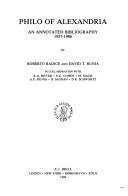
ISBN: 9004089861 9004312757 9789004089860 Year: 1988 Volume: 8 Publisher: Leiden: Brill,
Abstract | Keywords | Export | Availability | Bookmark
 Loading...
Loading...Choose an application
- Reference Manager
- EndNote
- RefWorks (Direct export to RefWorks)
The first author in which the traditions of Judaic thought and Greek philosophy flow together in a significant way is Philo of Alexandria. This study presents a detailed and comprehensive examination of Philo's knowledge and utilization of the most popular philosophical work of his day, the Timaeus of Plato. A kind of 'commentary' is given on all passages in Philo's oeuvre in which the Timaeus is used or referred to, followed by a 'synthetic' account of the influence that it had on Philo's thought.
Philo of Alexandria --- Philo --- 1 <=924> PHILO ALEXANDRINUS <01> --- Joodse filosofie:--oudheid en middeleeuwen--Bibliografieën. Catalogi--PHILO ALEXANDRINUS --- 1 <=924> PHILO ALEXANDRINUS <01> Joodse filosofie:--oudheid en middeleeuwen--Bibliografieën. Catalogi--PHILO ALEXANDRINUS --- Philo, --- Alexandria, --- Filon --- Filón, --- Filon, --- Filone, --- Philon, --- Philonis, --- Yedidyah, --- פילון --- פילון מאלכסנדריה --- פילון, --- פילון היהודי --- Филон Александрийский --- Filon Aleksandriĭskiĭ --- Pseudo-Philo --- Bibliography. --- History of philosophy --- Bibliography --- Filon Aleksandriĭski --- Philo - of Alexandria - - Bibliography --- The Early Church --- Humanities --- Philo - of Alexandria --- -Philo - of Alexandria --- -History of philosophy --- -Philo - of Alexandria -
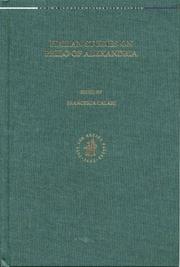
ISBN: 0391041894 9786610463886 1423714431 1280463880 9047400070 9781423714439 9789047400073 9780391041899 Year: 2003
Abstract | Keywords | Export | Availability | Bookmark
 Loading...
Loading...Choose an application
- Reference Manager
- EndNote
- RefWorks (Direct export to RefWorks)
A collection of essays offering an overview of the main trends of Italian research on Philo of Alexandria. The essays are approached from various perspectives, including historical, linguistic, philological and philosophical, thus reflecting the complexity and implications of Philo's thought.
Philo of Alexandria --- Philo, --- Alexandria, --- Filon --- Filón, --- Filon, --- Filone, --- Philon, --- Philonis, --- Yedidyah, --- פילון --- פילון מאלכסנדריה --- פילון, --- פילון היהודי --- Филон Александрийский --- Filon Aleksandriĭskiĭ --- Pseudo-Philo
Book
ISSN: 0920623X ISBN: 9004471960 9004499113 9789004471962 9789004499119 Year: 2022 Volume: 174 Publisher: Leiden: Brill,
Abstract | Keywords | Export | Availability | Bookmark
 Loading...
Loading...Choose an application
- Reference Manager
- EndNote
- RefWorks (Direct export to RefWorks)
This volume is a further continuation of the annotated bibliographies on the writings and thought of the Jewish exegete and philosopher Philo of Alexandria, following those on the years 1937-1986 (published in 1988), 1987-1996 (published in 2000) and 1997-2012 (published in 2012). Prepared in collaboration with the International Philo Bibliography Project, it contains a complete listing of all scholarly writings on Philo for the period 2007 to 2016. Part One lists texts, translations, commentaries etc. (75 items). Part Two contains critical studies (1143 items). In Part Three additional items up to 2006 are presented (27 items). In all cases a summary of the contents of the contribution is given. Six indices, including a detailed Index of subjects, complete the work.
Philo, --- Philon d'Alexandrie --- 296*332 --- 296*332 Philo van Alexandrië:--studies --- Philo van Alexandrië:--studies --- Philo --- Alexandria, --- Filon --- Filón, --- Filon, --- Filone, --- Philon, --- Philonis, --- Yedidyah, --- פילון --- פילון מאלכסנדריה --- פילון, --- פילון היהודי --- Филон Александрийский --- Filon Aleksandriĭskiĭ --- Pseudo-Philo --- Philo, - of Alexandria - Bibliography. --- Philosophy, American. --- American philosophy --- Philo, - of Alexandria
Multi
ISSN: 1543995X ISBN: 9789004184664 900418466X 9004203788 1283851989 9789004203785 Year: 2011 Volume: v. 6 Publisher: Leiden: Brill,
Abstract | Keywords | Export | Availability | Bookmark
 Loading...
Loading...Choose an application
- Reference Manager
- EndNote
- RefWorks (Direct export to RefWorks)
The volume aims to introduce the studies on the Armenian version of Philo's writings, as well as being valuable for scholars who are not Armenologists. This corpus of ancient translations is of great importance to us not only because it has preserved works whose Greek originals have been lost, but it will also be of use for improving our knowledge regarding the reception of Philo's thought. The essays approach the subject from different perspectives - historical, hermeneutical, philological and linguistic - in order to provide an overview on current research issues, giving special attention to the fortune of Philo's works in Armenian Christianity.
Philo, --- Philosophy, Ancient. --- Ancient philosophy --- Greek philosophy --- Philosophy, Greek --- Philosophy, Roman --- Roman philosophy --- Alexandria, --- Filon --- Filón, --- Filon, --- Filone, --- Philon, --- Philonis, --- Yedidyah, --- פילון --- פילון מאלכסנדריה --- פילון, --- פילון היהודי --- Филон Александрийский --- Filon Aleksandriĭskiĭ --- Pseudo-Philo --- Philo, - of Alexandria
Book
ISBN: 3161542770 9783161542770 3161530063 9783161530067 Year: 2015 Publisher: Tübingen: Mohr Siebeck,
Abstract | Keywords | Export | Availability | Bookmark
 Loading...
Loading...Choose an application
- Reference Manager
- EndNote
- RefWorks (Direct export to RefWorks)
Wie begreift Philo von Alexandria den Ursprung und das Wesen des menschlichen Verstands? Jang Ryu wirft neue Fragen zu Philos Sicht der Gotteserkenntnis auf und ermittelt zwei unterschiedliche aber verwandte Gruppen epistemologischer Konzepte in den Texten Philos, eine in jeder seiner exegetischen Schriften.
God --- Knowableness --- History of doctrines. --- Philo, --- Criticism and interpretation. --- Philo of Alexandria --- Second Temple Judaism --- Ancient Philosophy --- Epistemology --- Middle Platonism --- Antike Religionsgeschichte --- Neues Testament --- Antike Philosophie --- History of doctrines --- Dieu --- Cognoscibilité --- Histoire des doctrines
Book
ISSN: 0920623X ISBN: 9789004210806 9004210806 9786613326959 1283326957 9004216855 9789004216853 9781283326957 Year: 2012 Volume: 109 Publisher: Leiden: Brill,
Abstract | Keywords | Export | Availability | Bookmark
 Loading...
Loading...Choose an application
- Reference Manager
- EndNote
- RefWorks (Direct export to RefWorks)
This volume is a further continuation of the annotated bibliographies on the writings and thought of the Jewish exegete and philosopher Philo of Alexandria prepared by Roberto Radice and David Runia for the years 1937–1986 published in 1988 and by David Runia for the years 1987–1996 published in 2000. Prepared with the collaboration of the International Philo Bibliography Project, it contains a complete listing of all scholarly writings on Philo for the period 1997 to 2006. Part One lists texts, translations, commentaries et cetera (58 items). Part Two contains critical studies (1024 items). In part Three additional works for the years 1987–1996 are presented (42 items). In all cases a brief description of the contents of the contribution is given. Seven indices, including a detailed Index of subjects, complete the work.
1 <=924> PHILO ALEXANDRINUS <01> --- 296*332 --- 296*332 Philo van Alexandrië:--studies --- Philo van Alexandrië:--studies --- 1 <=924> PHILO ALEXANDRINUS <01> Joodse filosofie:--oudheid en middeleeuwen--Bibliografieën. Catalogi--PHILO ALEXANDRINUS --- Joodse filosofie:--oudheid en middeleeuwen--Bibliografieën. Catalogi--PHILO ALEXANDRINUS --- Philo, --- Alexandria, --- Filon --- Filón, --- Filon, --- Filone, --- Philon, --- Philonis, --- Yedidyah, --- פילון --- פילון מאלכסנדריה --- פילון, --- פילון היהודי --- Филон Александрийский --- Filon Aleksandriĭskiĭ --- Pseudo-Philo --- Filon Aleksandriĭski --- Philo, - of Alexandria - Bibliography. --- Western philosophy: Ancient, to c 500 --- The Early Church --- hellenistic --- platonism --- early church --- alexandria --- judaism --- new testament --- christianity --- philo --- Allegory --- Exegesis --- God --- Philo, - of Alexandria
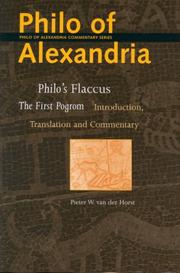
ISSN: 1570095X ISBN: 1280467541 9786610467549 1423712471 9047402308 9781423712473 9004131183 9789004131187 Year: 2003 Volume: v. 2 Publisher: Leiden Brill
Abstract | Keywords | Export | Availability | Bookmark
 Loading...
Loading...Choose an application
- Reference Manager
- EndNote
- RefWorks (Direct export to RefWorks)
This work contains an introduction to Philo's ""In Flaccum"" in which matters of genre, historical background, and textual evidence are discussed. The main part of the work is a detailed philological and historical commentary on Philo's text.
Avillius Flaccus. --- Jews. --- Jews - Persecutions - Egypt - Alexandria. --- Jews --- Regions & Countries - Asia & the Middle East --- History & Archaeology --- Middle East --- Persecutions --- Avillius Flaccus, --- Philo, --- Alexandria (Egypt) --- History. --- Hebrews --- Israelites --- Jewish people --- Jewry --- Judaic people --- Judaists --- Flaccus, --- Ethnology --- Religious adherents --- Semites --- Judaism --- Juifs --- Persécutions --- Alexandrie (Egypte) --- Histoire --- Avillius Flaccus --- Philo of Alexandria --- Egypt --- History
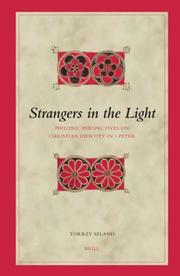
ISBN: 9004144919 9786610868438 1429453567 9047407938 1280868430 1433704293 9781429453561 9789004144910 9781433704291 Year: 2005 Volume: 76 Publisher: Leiden ; Boston Brill
Abstract | Keywords | Export | Availability | Bookmark
 Loading...
Loading...Choose an application
- Reference Manager
- EndNote
- RefWorks (Direct export to RefWorks)
The author of the present work wants to throw new light on the intended readers of 1 Peter by investigating what it could possibly mean that they were to live as Strangers in the Light. It is argued that the author of 1 Peter considers his readers as living a life influenced by social circumstances very much comparable to those of the Diaspora proselytes to Judaism. Hence similar discussions in Jewish Diaspora works can illuminate his descriptions and exhortations. Among these Diaspora works, the works of Philo of Alexandria should be drawn into the discussions in a much more comprehensive way than has been done so far. In addition to a study of the role of Silvanus in the making of the letter, this volume contains four studies that carry out what the author calls 'philonic readings' of central issues of 1 Peter 2,5-11. The study will demonstrate the usefulness of Jewish diaspora works for understanding the social life of the early Christians.
Etrangers dans la Bible --- Strangers in the Bible --- Vreemdelingen in de Bijbel --- 227*22 --- 227*22 Brieven van Petrus --- Brieven van Petrus --- Strangers in the Bible. --- Philo, --- Bible. --- Social scientific criticism. --- Alexandria, --- Filon --- Filón, --- Filon, --- Filone, --- Philon, --- Philonis, --- Yedidyah, --- פילון --- פילון מאלכסנדריה --- פילון, --- פילון היהודי --- Филон Александрийский --- Filon Aleksandriĭskiĭ --- Pseudo-Philo --- Epistle of Peter, 1st --- Peter, 1st (Book of the New Testament) --- Peter (Book 1) --- Bible. N.T. Peter I --- Social scientific criticism --- Philo of Alexandria --- Social scientific criticism of sacred works.
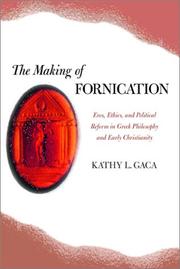
ISBN: 9786612356988 0520929462 1282356984 978058545633X 1597347280 9780520929463 058545633X 9780585456331 9781282356986 0520235991 9780520235991 9781597347280 6612356987 Year: 2003 Publisher: Berkeley University of California Press
Abstract | Keywords | Export | Availability | Bookmark
 Loading...
Loading...Choose an application
- Reference Manager
- EndNote
- RefWorks (Direct export to RefWorks)
This provocative work provides a radical reassessment of the emergence and nature of Christian sexual morality, the dominant moral paradigm in Western society since late antiquity. While many scholars, including Michel Foucault, have found the basis of early Christian sexual restrictions in Greek ethics and political philosophy, Kathy L. Gaca demonstrates on compelling new grounds that it is misguided to regard Greek ethics and political theory-with their proposed reforms of eroticism, the family, and civic order-as the foundation of Christian sexual austerity. Rather, in this thoroughly informed and wide-ranging study, Gaca shows that early Christian goals to eradicate fornication were derived from the sexual rules and poetic norms of the Septuagint, or Greek Bible, and that early Christian writers adapted these rules and norms in ways that reveal fascinating insights into the distinctive and largely non-philosophical character of Christian sexual morality. Writing with an authoritative command of both Greek philosophy and early Christian writings, Gaca investigates Plato, the Stoics, the Pythagoreans, Philo of Alexandria, the apostle Paul, and the patristic Christians Clement of Alexandria, Tatian, and Epiphanes, freshly elucidating their ideas on sexual reform with precision, depth, and originality. Early Christian writers, she demonstrates, transformed all that they borrowed from Greek ethics and political philosophy to launch innovative programs against fornication that were inimical to Greek cultural mores, popular and philosophical alike. The Septuagint's mandate to worship the Lord alone among all gods led to a Christian program to revolutionize Gentile sexual practices, only for early Christians to find this virtually impossible to carry out without going to extremes of sexual renunciation. Knowledgeable and wide-ranging, this work of intellectual history and ethics cogently demonstrates why early Christian sexual restrictions took such repressive ascetic forms, and casts sobering light on what Christian sexual morality has meant for religious pluralism in Western culture, especially among women as its bearers.
Sexual ethics --- Philosophy, Ancient. --- Sex --- Gender (Sex) --- Human beings --- Human sexuality --- Sex (Gender) --- Sexual behavior --- Sexual practices --- Sexuality --- Sexology --- Ancient philosophy --- Greek philosophy --- Philosophy, Greek --- Philosophy, Roman --- Roman philosophy --- History. --- Religious aspects --- Christianity --- History of doctrines. --- Philosophy, Ancient --- Influence. --- apostle paul. --- asceticism. --- bible. --- christianity. --- christians clement. --- church history. --- desire. --- early church. --- epiphanes. --- erotics. --- ethics. --- feminist theory. --- fornication. --- gender. --- greek bible. --- greek culture. --- innocence. --- moral paradigm. --- passion. --- phill of alexandria. --- philo of alexandria. --- philosophy. --- plato. --- political philosophy. --- purity. --- religion. --- religious pluralism. --- septuagint. --- sexual austerity. --- sexual morality. --- sexual reform. --- sexual renunciation. --- sexual restrictions. --- sexuality. --- sin. --- stoics. --- tatian. --- theology. --- women and religion. --- women.
Book
ISBN: 1282673157 9786612673153 3110225980 9783110225983 9783110225976 3110225972 Year: 2010 Publisher: Berlin: de Gruyter,
Abstract | Keywords | Export | Availability | Bookmark
 Loading...
Loading...Choose an application
- Reference Manager
- EndNote
- RefWorks (Direct export to RefWorks)
Since Origen and Chrysostom, John's Gospel has been valued as the most spiritual among the New Testament writings. Although Origen recognizes the Stoic character of John's statement that "God is pneuma" (4:24), an examination of the gospel in light of Stoic physics has not yet been carried out. Combining her insight into Stoic physics and ancient physiology, the author situates her thesis in the major discussions of modern Johannine scholarship - e.g. the role of the Baptist and the function of the Johannine signs - and demonstrates new solutions to well-known problems. The Stoic study of the Fourth Gospel reveals a coherent narrative tied together by the spirit. The problem with which John's Gospel wrestles is not the identity of Jesus, but the transition from the Son of God to the next generation of divinely begotten children: how did it come about? A reading carried out from a Stoic perspective points to the translation of the risen body of Jesus into spirit as the decisive event. The provision of the spirit is a precondition of the divine generation of believers. Both events are explained by Stoic theory which allows of a transformation of fleshly elements into pneuma and of multiple fatherhood. In fact, in his Commentary on John, Origen described Jesus' ascension as an event of anastoixeiôsis, which is the Stoic term for the transformation of heavily elements into lighter and pneumatic ones.
Spirit --- Stoics. --- Spirit. --- Pneuma --- Pneumatology (Philosophy) --- Pneumatology (Theology) --- Holy Spirit --- Soul --- Ethics --- Philosophy, Ancient --- Biblical teaching. --- Philo, --- Alexandria, --- Filon --- Filón, --- Filon, --- Filone, --- Philon, --- Philonis, --- Yedidyah, --- פילון --- פילון מאלכסנדריה --- פילון, --- פילון היהודי --- Филон Александрийский --- Filon Aleksandriĭskiĭ --- Pseudo-Philo --- Bible. --- Jean (Book of the New Testament) --- Johanisi (Book of the New Testament) --- Johannesevangelium --- John (Book of the New Testament) --- Yohan pogŭm --- Yohane den (Book of the New Testament) --- Yūḥannā (Book of the New Testament) --- Theology. --- Ioganaĭ (Book of the New Testament) --- Иоганай (Book of the New Testament) --- Spirit - Biblical teaching --- Philo, - of Alexandria --- Stoics --- 226.5 --- Biblical teaching --- Evangelie volgens Johannes --- Gender Studies. --- John's Gospel. --- Narrative Criticism. --- Stoicism.
| Listing 1 - 10 of 16 | << page >> |
Sort by
|

 Search
Search Feedback
Feedback About UniCat
About UniCat  Help
Help News
News